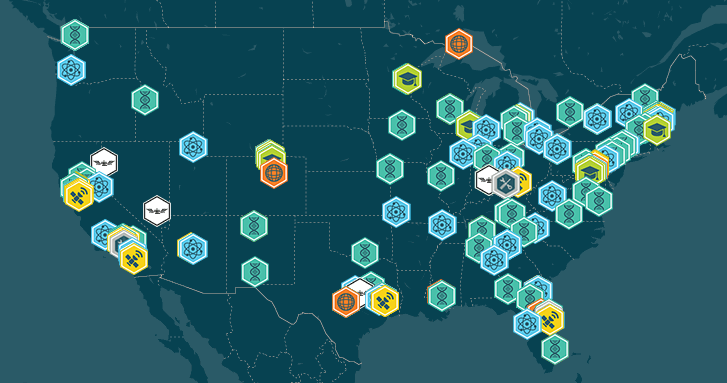At a Glance
- One new commercial ISS facility was installed in FY21, bringing the number to 18 commercial facilities operated by 10 Commercial Service Providers.
- In FY21, nearly 95% of CASIS funding was used to cover Implementation Partner costs for ISS National Lab-sponsored R&D, representing the highest percentage in a single fiscal year.
- Several Implementation Partners achieved important company milestones and expanded ISS capabilities this year.
In the 10 years since completion of the assembly of the space station, the ISS National Lab has worked alongside a growing network of Implementation Partners (see Appendix B for a full list) to expand the research and commercial capabilities onboard station for the benefit of Earth. Today, the 37 ISS National Lab Implementation Partners represent a broad range of organizations, from well-established aerospace companies with decades of experience to small innovative startups pushing space research boundaries. These companies continue to provide a full spectrum of payload services to an ever-growing number of ISS National Lab researchers. With the addition of one new ISS facility in FY21, there are now 18 commercial facilities on station operated by 10 Commercial Service Providers (the subset of Implementation Partners that manage permanent facilities on the ISS).
Since our founding, CASIS has recognized the importance of creating pathways to increase ease of access to the ISS for ISS National Lab Implementation Partners and their customers. In FY21 alone, nearly 95% of CASIS funding was used to cover Implementations Partner costs for researchers, the highest percentage in CASIS history. Additionally, CASIS has put into place contractual mechanisms that provide Commercial Service Providers with quicker access to their ISS facilities, further helping these companies to grow and operate at the speed of business. The ingenuity and passion of our Implementation Partners is accelerating the goal of the ISS National Lab to drive a thriving and sustainable LEO economy.
Key Commercial Service Provider facility updates from FY21 include the following:
- BioServe Space Technologies launched and validated a new facility: the Space Automated Laboratory Incubator (SALI), which will be used to incubate biological experiments in the microgravity environment; SALI is the 18th commercial facility on the ISS.
- BioServe also launched an upgraded version of its Space Automated Bioproduct Laboratory (SABL). Known as SABL-4, this facility will build on the success of the previous three versions, which have supported more than 40 different complex payloads representing NASA, commercial, academic, and other government agency research interests.
- Redwire Space launched its sixth manufacturing facility to the ISS: the Industrial Crystallization Facility (ICF), a commercial platform to support the growth and formulation of inorganic crystals for industrial applications such as high-power laser systems. Current ISS facilities for crystal growth are too small to accommodate large industrial crystals, and the ICF will fill this gap.
- The Redwire Ceramic Manufacturing Module (CMM) successfully manufactured a ceramic part in space for the first time. Ceramic manufacturing in microgravity could enable the production of temperature-resistant, reinforced ceramic parts with better performance for space and terrestrial applications such as turbines and internal combustion engines.
Examples of company milestones among Implementation Partners in FY21 include the following:
- Alpha Space, owner and operator of the MISSE Flight Facility, and MEI Technologies merged to create a new company, Aegis Aerospace Inc. Aegis is a woman-owned company that will offer commercial space services, flight and ground system development, systems engineering and integration, as well as modeling, simulation, and analysis.
- Voyager Space Holdings, Inc. announced that it acquired a majority of stake in X.O. Markets, whose largest subsidiary is Nanoracks. This was the fourth majority stake acquisition of a space company by Voyager, which will invest growth capital into Nanoracks to support its continued expansion.
- Redwire began trading on the New York Stock Exchange under the ticker symbol RDW after a merger with special-purpose acquisition company (SPAC) Genesis Park Acquisition Corporation. The deal provided Redwire with $170 million in capital.
- The Sierra Nevada Corporation spun off its Space Systems division into a separate company called Sierra Space. The new company’s portfolio will include Dream Chaser®, a reusable space plane, and a commercial space station, among a host of other products and services. With the establishment of this subsidiary, company leadership expects to grow its current $400M in revenue to $4B-$5B over the next 5 to 10 years.
Other key Implementation Partner activities from FY21 include the following:
- Axiom Space, Inc. announced the signing of an order with NASA for the first private crew visit to the ISS in early 2022. The Axiom Mission (Ax-1) will carry four crew members for an eight-day stay on station. The ISS National Lab has sponsored more than 30 payloads tied to the Ax-1 mission.
- Felix & Paul Studios won an Outstanding Interactive Program Emmy at the 73rd Annual Emmy Awards for its virtual reality (VR) series “Space Explorers: The ISS Experience,” produced in collaboration with TIME. The series uses special VR cameras designed to operate in microgravity to capture what it is like to live and work in space. Episode 1 of the series also won two Webby Awards.
- Nanoracks launched the first commercially funded airlock to the ISS: the Bishop Airlock, which provides five times the current volume to move items in and out of the ISS.
- Using the Nanoracks CubeSat Deployer, the company launched its 20th CubeSat mission from the ISS.




